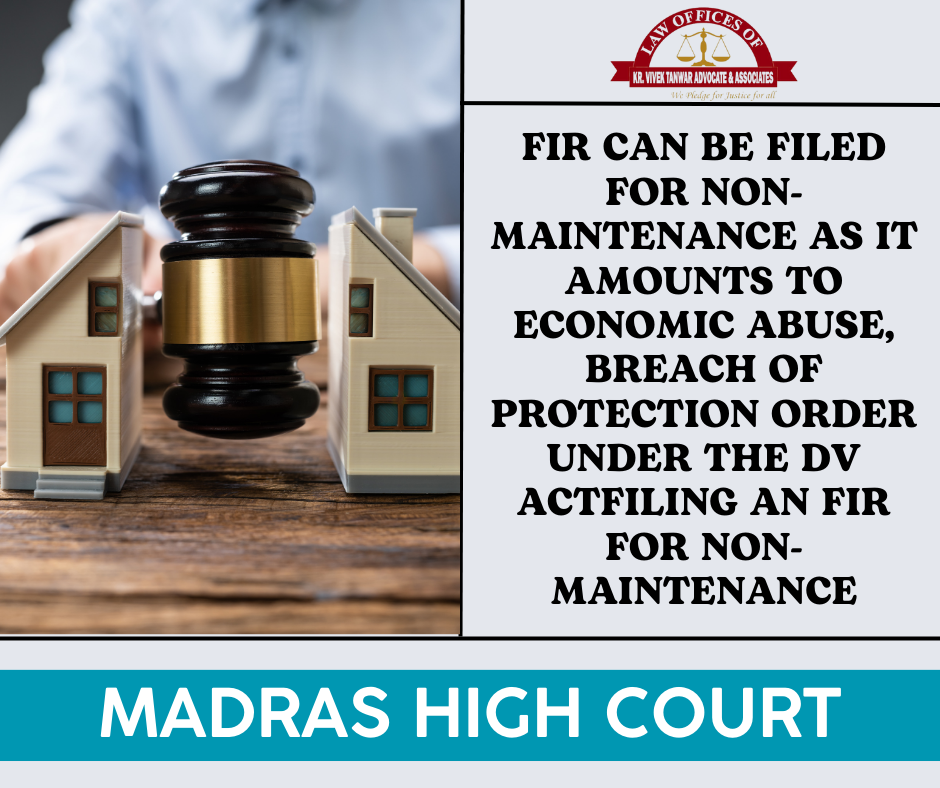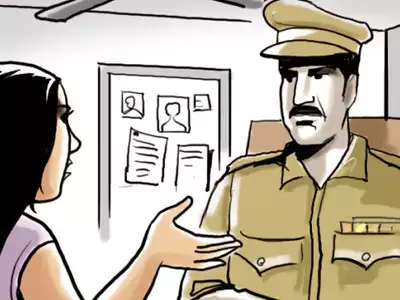Maintenance, a fundamental aspect of familial responsibility, is enshrined in Indian law to protect the financial interests of dependents who are unable to support themselves. Non-maintenance, where an individual neglects or refuses to provide financial support to their dependents, is a serious offence under Indian jurisprudence. In such cases, lodging a First Information Report (FIR) becomes crucial to initiate legal action against the defaulter. This article aims to provide a comprehensive legal analysis of FIRs for non-maintenance in India, including relevant laws, procedures, and implications.
Legal Framework
- Maintenance Laws in India: Maintenance laws in India are primarily governed by personal laws and statutes such as the Hindu Adoption and Maintenance Act, 1956, the Hindu Marriage Act, 1955, the Muslim Personal Law (Shariat) Application Act, 1937, and the Code of Criminal Procedure, 1973 (CrPC). These laws mandate that certain categories of individuals, including spouses, children, and parents, are entitled to maintenance from the person legally bound to support them.
- Code of Criminal Procedure, 1973 (CrPC): The CrPC is the procedural law governing criminal proceedings in India, including the registration of FIRs. Section 154 of the CrPC deals with the registration of FIRs, while Section 498-A specifically addresses cruelty towards a woman by her husband or his relatives, including the failure to provide maintenance.
- Indian Penal Code, 1860 (IPC): The IPC contains provisions related to offences against women and children, including non-maintenance. Section 125 of the IPC imposes a legal obligation on individuals to provide maintenance to their spouses, children, and parents who are unable to maintain themselves.
Filing an FIR for Non-Maintenance
- Identification of the Offender: The first step in filing an FIR for non-maintenance is identifying the person legally obligated to provide maintenance but has failed to do so. This could be a spouse, parent, or guardian, depending on the circumstances.
- Grounds for Non-Maintenance: The complainant must establish valid grounds for alleging non-maintenance, such as financial neglect, willful refusal, or abandonment by the person obligated to provide maintenance.
- Documentary Evidence: The complainant should gather documentary evidence, such as bank statements, receipts, or correspondence, to substantiate the claim of non-maintenance.
- Approaching the Police: The complainant can approach the nearest police station and file an FIR for non-maintenance under Section 498-A of the IPC, citing the relevant provisions of the personal laws applicable to their situation.
- Recording of FIR: Upon receipt of the complaint, the police are obligated to register an FIR under Section 154 of the CrPC and initiate an investigation into the matter.
- Investigation and Legal Proceedings: The police will investigate to gather evidence and establish the veracity of the complaint. If the evidence warrants, legal proceedings will be initiated against the accused under the relevant provisions of the law.
Legal Implications and Remedies
- Criminal Prosecution: Non-maintenance is a criminal offence punishable under Section 125 of the IPC. Upon conviction, the defaulter may be liable to pay a fine or undergo imprisonment, as determined by the court.
- Civil Remedies: In addition to criminal prosecution, the aggrieved party may also seek civil remedies, such as filing a petition for maintenance under the relevant personal laws or the Domestic Violence Act, seeking interim maintenance during the pendency of legal proceedings.
- Enforcement of Maintenance Orders: Once a maintenance order is passed by the court, the defaulter is legally obligated to comply with the same. Failure to do so may result in contempt of court proceedings and further penalties.
- Recovery Proceedings: In cases of non-compliance with maintenance orders, the aggrieved party can initiate recovery proceedings through the execution of decrees or attachment of the defaulter’s property, as per the provisions of the Civil Procedure Code.
Challenges and Considerations
- Burden of Proof: The burden of proving non-maintenance lies on the complainant, who must provide sufficient evidence to substantiate the allegations made in the FIR.
- Delayed Justice: Legal proceedings for non-maintenance often involve lengthy court processes and delays, which may prolong the agony of the aggrieved party.
- Social Stigma: Victims of non-maintenance may face social stigma and ostracism, particularly in conservative communities, which can deter them from seeking legal recourse.
- Financial Dependency: In cases where the aggrieved party is financially dependent on the defaulter, initiating legal proceedings may pose practical challenges due to a lack of resources or support.

While ruling on a most significant legal point pertaining directly to the maintenance of women, the Madras High Court in a most robust, rational and remarkable judgment titled S Amalraj Vs State and Another in Crl. O.P.(MD)No.15704 of 2018 and Crl. M.P.(MD)Nos.6953 & 6954 of 2018 and cited in 2023 LiveLaw (Mad) 191 that was pronounced on March 6, 2023, has ruled clearly that non-payment of maintenance amount is a breach of protection order under Section 18 of the Act and registration of an FIR on that ground is lawful. It must be mentioned here that Hon’ble Mr Justice KK Ramakrishnan of the Madurai Bench of Madras High Court laid bare that Section 31 of the Protection of Women Against Domestic Violence Act was enacted to ensure social justice and to regulate the violator of a protection order. It must be also disclosed here that the Court has in this leading case termed this provision a life-saving medicine by treating failure of remittance of maintenance as an offence and crime. The Court was hearing a plea that was filed by a man for quashing the proceedings that were pending before the Judicial Magistrate, Devakottai based on an FIR registered for the offence under Section 31 of the DV Act.
Conclusion
Filing an FIR for non-maintenance is a critical step towards seeking justice and upholding the rights of the aggrieved party. By understanding the legal framework surrounding non-maintenance laws in India and following the prescribed procedures, individuals can initiate legal action against defaulters and secure the maintenance to which they are entitled. However, it is essential to navigate the legal process with caution, considering the challenges and implications involved. With the support of legal counsel and advocacy, victims of non-maintenance can assert their rights and seek redress through the appropriate legal channels.
Adv. Khanak Sharma


The team always ensures that I understand my medication fully.
can i buy generic lisinopril without a prescription
They provide a world of health solutions.
The free blood pressure check is a nice touch.
is gabapentin good for sleep
Medicament prescribing information.
Their international health forums provide crucial insights.
what if i miss my dose of gabapentin
Top 100 Searched Drugs.
Their international drug database is unparalleled.
can i get cipro
Their team understands the nuances of global healthcare.
A pharmacy that genuinely cares about community well-being.
list of side effects of gabapentin
Efficient, effective, and always eager to assist.